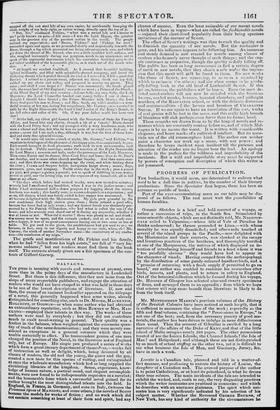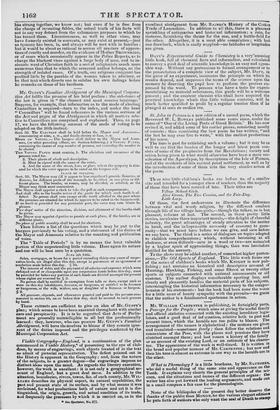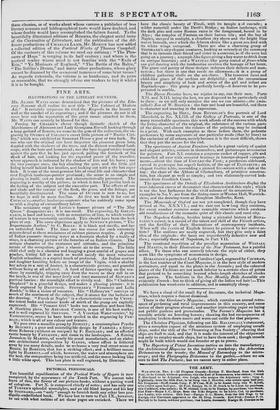PROGRESS OF PUBLICATION.
THE booksellers, it would seem, are determined to enliven what used to be a dull time in politics, by the number of their literary productions. Since the Spectator first began, there has been no. autumn so prolific of books. Part of the ever-accumulating mass on our table may be dis- posed of as follows. The rest must wait the possibilities of human faculties.
Oceanic Sketches is a brief and bold acconnt of a voyage, or rather a succession of trips, in the South Sea. Stimulated by some scientific objects, which are not distinctly told, Mr. NIGHTIN- GALE sailed to Valparaiso,—whose title of Vale of Paradise he- thinks undeserved; he thence proceeded to Lima,—with whose morality he was equally dissatisfied ; and afterwards touched at several of the island groups in the Pacific,—now delighted with the Missionaries and their converts, now shocked at the savage and licentious practices of the heathens, and thoroughly terrified at one of the Marquesans, the natives of which displayed an in- tention of introducing himself' and friends to a feast where it was " too painfully obvious" they would have had to appear in the character of viands. Having escaped from the anthropophagi by the distribution of some gaudy-coloured handkerchiefs, and a " promise of returning with a fresh supply if permitted to go on board," our author was enabled to continue his researches after birds, insects, and plants, and to return in safety to England. Out of the botanical collection which be formed during his voyage, Dr. HOOPER of Glasgow has selected nine-and-twenty specimens of ferns, and arranged them in an appendix ; from which we hope that science will reap more benefit than literature is likely to do, from the book itself.
Mr. MONTGOMERY MARTIN'S previous volumes of the History of the Bristish Colonies have been noticed at such length, that it is sufficient to announce the close of the work ; especially as the fifth and final volume, containing the "Possessions in Europe," is not one of the best; and, from the necessary paucity of good ma- terials, the author has been driven to indulge in more diffusiveness than usual. Thus the account of Gibraltar is swelled by a long narrative of the affairs of the Duke of KENT, and that of the little island of Malta occupies nearly 200 pages. The other possessions treated of are the Ionian Islands, the Channel Islands! the Isle of Man ! and Heligoland; and although these are not distinguished by so much of actual stuffing as the other two, yet it is difficult to see what business the Isle of Man, and Guernsey, Jersey, &c. have in such a work.
Lorette is a Canadian tale, planned and told in a matter-of- fact manner, and professing to narrate the history of Louise, the daughter of a Canadian nun. The avowed purpose of the author is to paint Catholicism, or at least its priesthood, in what he deems their true colours. The main incidents of the tale are intended to exhibit the wicked, and, sooth to say, the very disgusting practices which the writer insinuates are practised in nunneries; and which he describes with an unctuous plainness. The spirit which ani- mates him is very significantly indicated by his selection of his subject matter. Whether the Reverend GEORGE BOURNE, of New York, has any kind of authority for the circumstances he his strung together, we know not ; but even if he is free from the charge of inventing fables, the actual truth of his facts will not in any way detract from the calumnious purposes to which he has turned them. Licentiousness, as well as other vices, may have formerly existed in convents, or may exist at present,—just as tyranny has been, is, and always will be met with in families : but it would be about as rational to accuse all masters of appren- tices of cruelty and murder, on the evidence of Mother BROWNRIGG, or of cases which occasionally appear in the Police Repents, as to charge the blackest vices against a large body of men, and to in- sinuate want of Christian faith in a sect of religionists much more numerous than that to which the reverend author belongs, on the strength of isolated cases. Of a truth, our religious emigrant has profited little by the parable of the woman taken in adultery, or by that text which directs one to subdue his own failings before he remarks on those of his brethren.
Mr. GUPPY'S Familiar Abridgment of the Municipal Corpora- lion Act fulfils the promise of his brief preface : the substance of the law is given in " the clearest and most concise language." Suppose, for example, that information as to the mode of electing Councillors is required—turn to the index, and under the head 4' Councillors' will be found references to the various sections of the Act and pages of the Abridgment in which all matters rela- tive to Councillors are comprised and explained. Thus, on page 17, we have the following account of the mode of voting to be adopted on the 26th instant.
Sect. 82. The ELECTION shall be held before the Mayor and Assessors— commencing at nine, A.M., and finally closing at four, P.M.
MODE OF Vorizio.— The burgess shall deliver to the Mayor and Asses- sors, (or other presiding officer, see Section following, ) a VOTING PA PER, containing the names of any number of persons, not exceeding the number to be elected.
THE VOTING PAPER must contain, I. The christian and surnames of the persons voted for.
2. Their places of abode and description. 3. Must be signed with the name of the voter.
4. And the name of the street, lane, or place where the property is situ- ated for which the voter appears to be rated on the burgess-roll.
PLACE OF POLLING.
Sect. M. The Mayor may (if it appear to him expedient) provide l3oorirs, or Rooms, for different parts of the borough, to be either in one place or dif- ferent places. The booths, or rooms, may be divided, Of allotted, as the Mayor may think most convenient. The Mayor shall appoint a clerk to take the poll at each compartment ;
And shall affix to the booths notice of the ,parts for which such booth is al- lotted. No person shall vote except at the booth allotted to the part where the premises are situated for which be appears to be rated in the burgess-roll.
If no booth is provided for any particular part, the voter may vote where he pleases. Two days' notice of the situation, division, and allotment of the booths shall be given. The Mayot may appoint deputies to preside at each place, if the booths, are in different places. No place of public worship shall be used for elections.
Then follows a list of the questions which may be put to the burgess previously to his voting, and a statement of the duties of the Mayor and Assessors relative to the counting and publication of votes.
The "Table of Periods" is by no means the least valuable portion of this unpretending little volume. Here again its nature and use will be best seen by a quotation.
Jr NE iith 18435.
Sales, mortgages, or leases for a period exceeding thirty-one years of corpo- ration lands, are illegal after this day, except in pursuance of an agreement or resolution made before this day. § 94.
The interest of debts and the payment of all salaries and expenses which were defrayed out of or chargeable upon any corporation funds before this day, must be provided for before any portion of such funds are divided amongst the persons whose rights are reserved by § 2.
No person shall be entitled to exemption from tolls or dues, except such as were on this day inhabitants, freemen, or burgesses, or entitled to be freemen or burgessses, or the wife, widow, son, or daughter of a freeman or burgess. 2.
All pensions, stipends, and allowances granted and paid to the persons enu- ineratts1 in section IA on or before this day, shall be secured to such persons by bond.
These extracts are sufficient to give an idea of Mr. GUPPY'S plan; which seems to have been executed throughout with similar care and perspicacity. It is to be regretted that Acts of Parlia- ment are generally unintelligible to all but the professionally learned : they, however, who can procure Mr. Ginger's Familiar Abridgment, will have themselves to blame if they remain igno- rant of the duties imposed and the privileges conferred by the Municipal Corporation Act.
Visible Geography—England, is a continuation of the plan commenced in Visible History,* of presenting to the eye of chil- dren, by means of engravings, such objects treated of in the text as admit of pictorial representation. The defect pointed out in the History is apparent in the Geography ; and, from the nature of the subjects, to a greater degree—the engravings impress no distinct ideas upon the mind. As regards the literary execution, however, the work is excellent: it is not only a geographical ac- count of England, but a great deal more. In addition to the situation, boundaries, rivers, towns, 8r.c, of each county, Mr. W IL- LIAMS describes its physical aspect, its natural capabilities, the past and present state of its surface, and by u hat means it was reclaimed, for what productions both of nature and art it is dis- tinguished, the origin, growth, and actual condition of its trade, and frequently the processes by which it is carried on, as in the See Spectator, No. S77. se. excellent abridgment from Mr. BAINES'S History of the Cotton Trade of Lancashire. In addition to all this, there is a pleasant sprinkling of antiquarian and histor!cal information; a ruin, for instance, furnishing the theme for the one, and a battle-field for the other. Altogether, it is a most able compilation ; with but one drawback, which is easily supplied—no latitudes or longitudes are given.
DAVY'S Experimental Guide to Chemistry is a very•atnusing little book, full of chemical facts and information, and calculated to convey a good deal of scientific knowledge in an easy and agree- able way. Without any pretensions to formal arrangement or to the presentation of a complete view of the subject, Mr. DAVY', in the guise of an experiment, insinuates the principle on which its results depend, and impresses the terms of the science upon the memory by directing the pupil how to perform the process ex- pressed by the word. To persons who have a taste for experi- mentalizing on material substances, this guide will be a welcome present ; and the amateur chemist who shall have acquired the practical knowledge which this little volume contains, will be much better qualified to profit by a regular treatise than if he plunged at once in medias res.
St. John in Palms is a new edition of a sacred poem, which the Reverend W. L. BOWLES published some years since. under the name of" One of the Living Poets of Great Britain." He has now revised it, and added some of his earlier pieces, consisting mostly of sonnets ; thus combining the last poem he has written, "and the last he may ever live to write," with the earliest productions of his muse.
The time is past for criticising such a volume; but it may be as well to say that the burden of the longer and latest poem con- sists of some of the prophecies from the Revelations; variety and action being given to what would otherwise have been a mere ver- sification of the Apocalypse, by descriptions of the Isle of Patmos, and of the residents of this ancient penal settlement, as well as by the introduction of some of them into the very slender action of the poem.
Three nice little children's books are before us, of a smaller size and intended for a younger class of readers, than the majority of those that have been noticed of late. Their titles are Village School-Girls. Alice Grant, The Two Cousins, and the Fair-Day.
Little Lucy.
Of these, the first endeavours to illustrate the difference between vital and wordy religion, by the different conduct through life of too village lace-girls,—though the talker, as is but pleasant, reforms at last. The second, in three pretty little stories, inculcates three important morals,—the delight of cheerful industry, the great advantages of steady attention to the matter in band, and the indispensable necessity of economy to gene- rosity—that we must have before we can give, and save before we can have. The third is a series of dialogues on topics adapted to childish comprehensions; which, without becoming at all abstruse, or even difficult—save in a word or two—are animated by a higher spirit of appreciating things, than was heretofore distilled for the nursery.
To the above may be added another, of somewhat higher preten- sions,—The Old Sports of England. This little work forms one of the series of children's books which Mr. KNIGHT is now pub- lishing; and contains an historical and descriptive account of Hunting, Hawking, Fishing, and some fifteen or twenty other sports or subjects connected with national amusements or old customs. The author displays considerable sporting lore, and clearly and pleasantly handles the material parts of his subjects, intermingling the historical information necessary to the compre- hension of his statements: but the book had been none the worse for a little more of hearty sympathy with the pursuits—we guess that the author is a fainthearted sportsman in action.
Mr. WILLIAM CARPENTER is publishing, in fortnightly parts, a Peerage for the People ; which aims at giving the useful family and official statistics connected with the existing hereditary legis- lators, and a good deal of information, relative both to past and present times, which the heralds are too polite to blazon. The arrangement of the names is alphabetical ; the mottoes are given and translated—sometimes freely ; then follow the relations and connexions of the Peer, with the places and pensions they have clutched amongst them; and last comes a history of the family or an account of the existing Lord, or an estimate of his charac- ter. The appearance of the work is well-timed. It is written in the broad and popular manner of Mr. CARPENTER; but now and then his tone is almost as extreme in one way as the heralds are in the other.
What is Phrenology P is a little brochure, by Mr. SAUNDERS, who did a useful thing of the same size and appearance on the Teeth. It explains very clearly the general principles of the sets ence, and the situations and names of the different organs: the writer has also put forward the leading arguments, and made out in a small compass a fair case for the phrenologists.
None of the bibliopoles of the present day better deserve the thanks of the public than Moxos, for the various elegant editions he puts forth of authors who only want the seal of Death to stamp them classics, or of works about whose success a publisher of less literary acumen and bibliographical taste would have doubted, and whose doubts would have accomplished the failure feared. To the beautifully illustrated editions of ROGERS, the elegant serial issue of the Curiosities of Literature, and the publication of the dif- ferent productions of CHARLES LAMB, Mr. Mosmst has now added a collected edition of the Poetical Works nf Thomas Campbell. Of the contents of this volume we need say nothing : "The Plea- sures of Hope" is verging to its half century ; and where is the poetical reader whose mind is not familiar with the "Exile of Erin," "Ye Mariners of England," "The Battle of the Baltic," "The Soldier's Dream," and many other productions, whose glory cannot be dimmed by the occasional tameness of some later verses ? As regards externals, the volume is so handsome, and its price so reasonable, that we strongly advise our readers to buy it whilst it is to be bought.




























 Previous page
Previous page